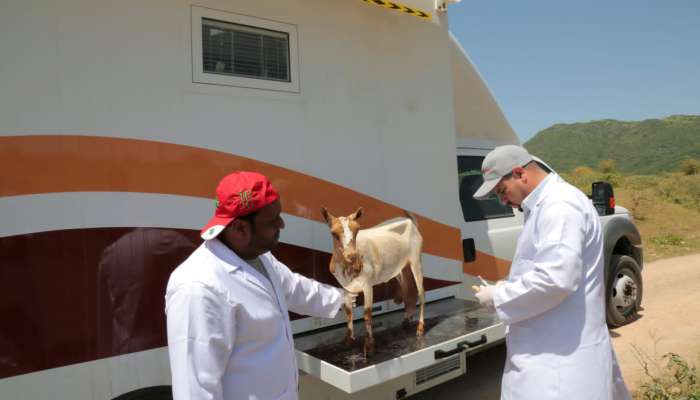

Muscat: The Sultanate of Oman joins the world today in celebrating the International Day of the Veterinarian, in appreciation of their role for community service, achieving food security, developing economy and preserving public health.
The Ministry of Agriculture, Fisheries and Water Resources appreciates the efforts of veterinarians in preserving the livestock in the Sultanate of Oman and working on to prevent animals from various diseases.
The number of veterinary doctors working in the Sultanate of Oman in government and private veterinary facilities is more than 750.
Eng. Khalfan bin Matar Al Sharji, Director General of Livestock at the Ministry of Agriculture, Fisheries and Water Resources, stressed that the ministry will continue to pay attention to veterinarians in all aspects of work, with the aim of developing livestock and their products, and for their important role in protecting them against epidemics through vaccines.
He explained that the medical practices performed by the veterinarian are represented in surgeries, obstetrics, and forensic medicines, not to mention the human dimension, which is represented in alleviating the pain of animals that cannot complain and achieving the principle of animal welfare.
He pointed out that among the important roles played by the doctor in all areas of public health is the examination of meat in slaughterhouses and the health supervision of animal products with the aim of providing consumers with healthy and safe food.
The veterinarian is considered one of the most important pillars in combating more than 200 common diseases between humans and animals. Studies have shown that 80% of the pathogens that affect humans are of animal origin.
Veterinarians contribute to combating epidemics that can be transmitted from animals to humans, such as avian influenza and the emerging coronavirus (Covid-19). They diagnose these diseases and take necessary measures to prevent their spread, including isolation, disinfection and sterilisation of common spaces.
They are the first line of defence against cross-border animal diseases, by imposing strict control at the land, sea and air outlets, where the veterinarians are tasked with preventing the passage of infected live animals that carry diseases, supervising meat and animal products, and following up the epidemiological situation regionally.
With ONA inputs